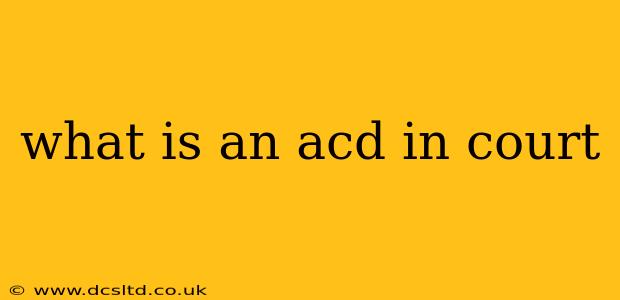An ACD, or Adjournment in Contemplation of Dismissal, is a legal procedure used primarily in criminal courts, though it can sometimes appear in civil cases. It's essentially a period of probationary postponement where charges are temporarily suspended. Instead of immediate sentencing or trial, the defendant agrees to fulfill specific conditions within a set timeframe. If the defendant successfully completes these conditions, the charges are dismissed, leaving them with a clean record. However, failure to meet the conditions can result in the original charges being reinstated and the defendant facing the full consequences.
What Happens During an ACD?
The process usually involves a court hearing where the judge and the defendant, along with their legal counsel, agree on the terms of the ACD. These terms might include:
- Specific conditions: This could involve completing community service, attending rehabilitation programs (drug or alcohol treatment, anger management), attending counseling sessions, paying restitution to victims, or maintaining a clean record (no further arrests).
- Timeframe: The ACD will have a set duration, often several months or a year. The defendant must adhere to the agreed conditions for the entire period.
- Regular check-ins: The defendant may be required to report regularly to the court or probation officer to ensure compliance.
- Drug/alcohol testing: This is common, particularly in cases involving substance abuse.
Failure to comply with any of these conditions will result in the court revoking the ACD and proceeding with the case as if the agreement had never been made. This could lead to a trial, conviction, and sentencing.
What are the Advantages of an ACD?
- Avoids a criminal record: Successful completion leads to dismissal of the charges, preventing a criminal record which can hinder future employment, housing applications, or educational opportunities.
- Opportunity for rehabilitation: The conditions often include programs designed to address the underlying issues that contributed to the offense, promoting positive change.
- Reduces court caseload: It allows courts to manage cases more efficiently, focusing resources on cases that require full prosecution.
What are the Disadvantages of an ACD?
- Conditional freedom: The defendant remains under the court's supervision and must strictly adhere to the conditions.
- Potential for revocation: Any violation of the conditions could result in serious consequences.
- Not suitable for all cases: ACD is typically offered in less serious cases where the defendant shows remorse and a willingness to change. Violent crimes or those involving significant harm to others are unlikely candidates.
Is an ACD the same as a dismissal?
No, an ACD is not the same as a dismissal. A dismissal means the charges are dropped immediately. An ACD is a conditional dismissal; the charges are dropped only after successful completion of the agreed-upon conditions. While the ultimate outcome might be the same – a clean record – the path to achieve it is different.
Can an ACD be used in civil court?
While primarily used in criminal cases, some civil courts might employ similar strategies where a case is adjourned pending the completion of certain conditions, though the terminology and application may differ.
What happens if I violate the terms of my ACD?
Violation of the terms of your ACD will lead to a hearing where the court will review the violation. The judge may decide to reinstate the original charges, potentially leading to a trial and harsher penalties than originally faced.
This information is for general educational purposes only, and does not constitute legal advice. If you have specific legal questions regarding an ACD, you should consult with a qualified attorney in your jurisdiction.
